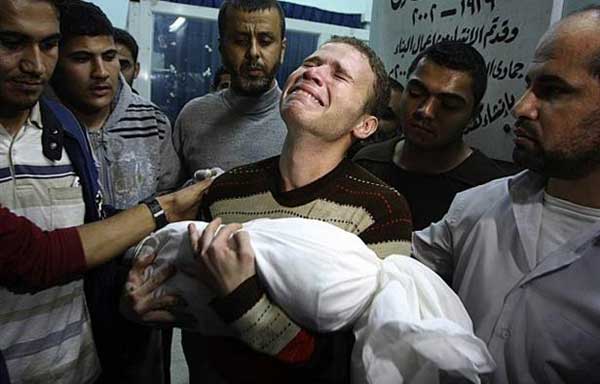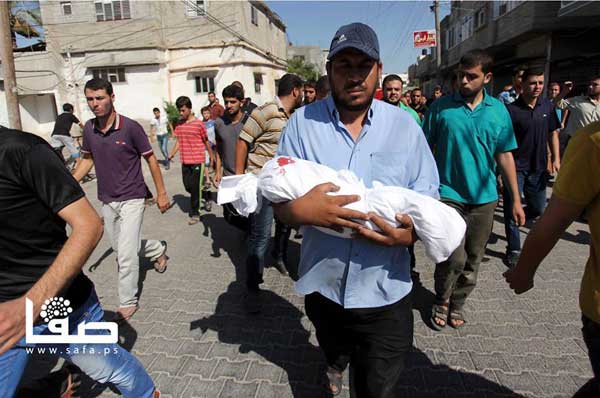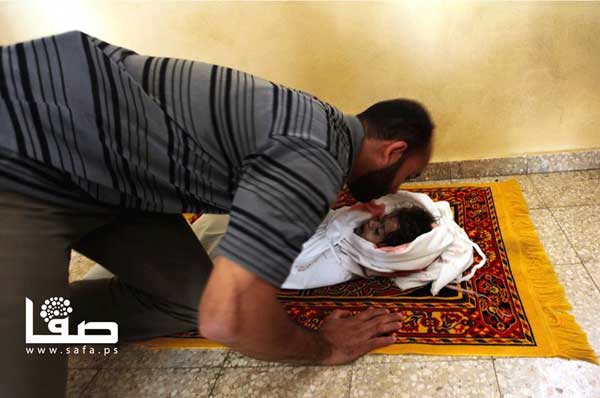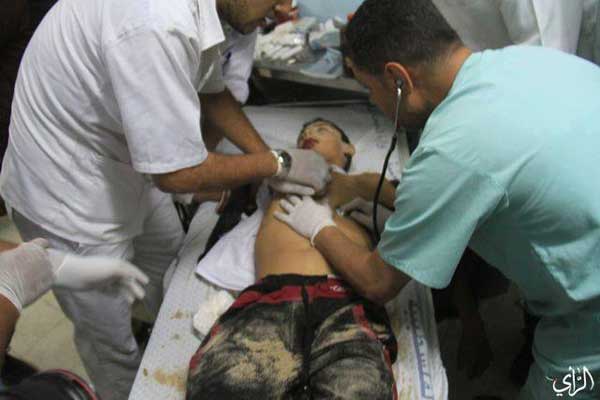On July 8, I wrote about the military escalation between Israel and the Palestinians.
I noted that when Israel killed Palestinians, nothing happened, and no one cared. But when three Israelis were kidnapped – as it turned out, murdered – Israel’s retaliation was massive, imposing what human rights organisations called “collective punishment” on the Palestinians, imposing “widespread raids” on Palestinian homes, arresting hundreds of Palestinians, imposing closures on hundreds of thousands of Palestinians, and killing several more Palestinians.
Palestinians responded by firing rockets from Gaza. Israel responded with air strikes. At the time of writing, we are now entering the ninth day of Israel’s assault on Gaza.
In the midst of massive bombardment, it is difficult to get a clear and comprehensive picture of what is happening, and comprehensive investigations into the bombardment have yet to be carried out.
According to Israeli journalist Noam Sheizaf, Israel has already dropped more than 1,500 tonnes of bombs on Gaza.
YNet, the online English version of one of Israel’s most popular papers, casually reports that the Israeli army has “attacked over 1,600 terror targets”.
It is not just the Israeli media that has linked Israeli bombing targets to terrorism. As noted by As’ad AbuKhalil, the Huffington Post, reciting Israeli propaganda, has referred to Israel bombing “civilian institutions with suspected Hamas ties”.
Bombing “civilian institutions”, one might think, was a war crime. The Guardian, at the supposedly more progressive end of the spectrum, featured a report that Israel bombed “a mosque, Hamas-affiliated charities and an Islamic home for the disabled”.
It takes a particular mindset – and a willingness to dehumanise Palestinians – to regard it as okay to bomb charities, on the grounds that they are affiliated with the government that won free and fair elections in the occupied Palestinian territories.
As for those who have been killed and injured by the bombing, if our picture is not yet definitive, it is reasonably clear.
Rockets fired at Israel have killed one Israeli: a man who visited a Gaza border crossing “to distribute food and drinks to soldiers awaiting a possible ground invasion into the Strip.”
I imagine if he were Palestinian, he would be regarded as something like a “terrorist supporting infrastructure”, or a “civilian with suspected” army links.
As for the Palestinians, according to the United Nations Office for the Coordination of Humanitarian Affairs (OCHA), 194 Palestinians have been killed so far by Israel, 149 of them civilians, 38 of them children.
That makes about 75 percent of Palestinians killed by Israel civilian.
At least 1,390 Palestinians have been injured, 1,370 homes have been destroyed or severely damaged, displacing 8,200 people.

The Palestinian Centre for Human Rights has issued daily briefings, meticulously documenting major Israeli attacks on Gaza.
Its latest report found that 181 Palestinians had been killed so far by Israel, 147 of them civilian, including 36 children and 29 women.
They also found 1181 Palestinians had been injured so far. It may be noted their figures are strikingly similar to OCHA’s.
Similarly, the Al Mezan Centre for Human Rights has documented Israeli bombardment of Gaza.
On the ninth day of bombing, they found that Israel had killed 194 Palestinians, including 37 children, and 28 women.
They found that 141 of the Palestinians killed were civilians, making for a total of 72.7 percent of Palestinians killed civilians.
They found that an additional 1,218 Palestinians had been injured by Israel, 1,489 houses were damaged or destroyed.
Al Mezan also reported that “IOF attacks also damaged or destroyed 25 schools, 37 mosques, an ambulance centre, 13 NGO offices, 38 fishing boats and 4 hospitals.”
OCHA found that “79 schools have been damaged due to their proximity to targeted sites.” 24 Israelis have been treated for injuries caused by rockets fired from Gaza.
OCHA then went on to observe:
Damage to health, education, water and sanitation facilities, and electricity infrastructure make it increasingly difficult to provide even the most basic services for the civilian population, with hundreds of thousands of Gazans without water.
The current crisis is exacerbated by the high degree of pre-existing vulnerability in the Gaza Strip, with high unemployment and the lack of a viable economy as a result of years of Israeli occupation, strict movement and access restrictions, internal division and sporadic conflict, which have exhausted people’s coping mechanisms.
Of particular concern is the lasting impact on children, with UNICEF staff on the ground warning of the long term impact which the current violence is having on children, who are not sleeping or eating and who are exhibiting harrowing signs of mental distress.
OCHA warned that at least 25,000 Palestinian children needed “psychosocial support”, due to the trauma of the murder or injury of their families, or destruction of their homes. And 600,000 Palestinians are at risk of losing access to water supply.
Furthermore, there is a “massive shortage in drugs and disposables (28 and 54 per cent respectively) at Gaza Hospitals”. Around 400,000 Palestinians in Gaza City are without electricity.
As about three quarters of those killed by Israel are civilians, it should be plain that Israel is committing war crimes, and each day its offensive continues, it knows that it will kill more innocent people.
Every human rights organisation condemns the rockets fired from Gaza as war crimes, because they are indiscriminate.
Morally, it is uncomplicated to condemn bombs that are unable to discriminate between civilian and military targets.
As Israel has killed around 200 Palestinian civilians at time of writing, it is either attacking Gaza with bombs unable to discriminate between military targets and civilian ones – precisely what it accuses Hamas and other Gazan groups of – or it is deliberately bombing civilian targets, which makes its wanton murder of Palestinians even worse.
That it has not appeared to outrage Australian commentators and public intellectuals is sad and appalling, if unsurprising.
A while ago, the Saturday Paper featured a Swift-ian style satire, in which Richard Flanagan mockingly suggested that Australians bomb asylum seekers on boats headed to Australia, to appease racists in Western Sydney.
This was presumed to be the kind of savagery that no right-thinking person could possibly condone.
Yet Israel is presently bombing Gaza – 1.2 million of their 1.7 million inhabitants are refugees from the Nakba.

That kind of savagery apparently is not so absurd as to be satirical: it is flatly uninteresting, for all the progressives who remain silent in the face of yet another Israeli onslaught.
Whilst the bombardment exacerbates the trauma of the Palestinians in Gaza who survive it, it should also be noted that the blockade on Gaza has been utterly devastating.
The literature on it is vast, but a few points should be illustrative.
Israeli human rights organisation Gisha notes that the unemployment rate in Gaza is over 40 per cent.
That is higher than the rate of unemployment during the Great Depression – and we still remember the trauma caused from that.
Furthermore, more than 70 per cent of the population of Gaza now depends on humanitarian aid. All this is deliberate cruelty, inflicted on the civilian population of Gaza by Israel.
A Wikileak cable from 2008 showed that Israeli officials “have confirmed to (U.S. embassy economic officers) on multiple occasions that they intend to keep the Gazan economy on the brink of collapse without quite pushing it over the edge”.
The brink of collapse is a subjective term – a government that has decided it is okay for the Palestinians to suffer might have a different idea as to what level of suffering is adequate for the Palestinians to live through.
Consequently, after years of the siege, 90 percent of Gaza’s water was no longer suitable for drinking.
Israel wouldn’t allow in the materials needed to repair Gaza’s water supplies.
Israel’s security cabinet considered its sadism a use of “civilian levers” against Hamas.
Inflicting harm on civilians for political goals is considered terrorism when engaged in by Arabs and Muslims, yet Israel’s open avowal of the same policy has been met with indifference in the West.
There are some who seem okay with the targeting of innocent Palestinians. In a shocking editorial on the latest round of violence, the Australian commented:
In some respects, Israel is doing remarkably less than it could. One day last week, when Hamas fired 100 rockets aimed at civilian targets deep inside Israeli territory, Israel allowed 170 truckloads of food and other supplies into Gaza as usual. So far, the flow of electricity, water and fuel from Israel on which Gaza’s 1.8 million citizens rely has continued as normal.
Is Israel doing “remarkably less than it could” by allowing Palestinians in Gaza to have water and food? The Australian seems to be suggesting that it would be reasonable for Israel to deny 1.8 million people food and water.
The Wikileak cable also noted in 2009 that “Israelis are enjoying the best security situation since the outbreak of the second intifada in 2000”, due in part to the “good security cooperation with the Palestinian Authority’s security forces” in suppressing resistance to Israel in the West Bank.
Hamas had similarly helped protest Israel: Major General Yoav Galant said that “In the short term, Israel wants Hamas to be strong enough to enforce the de facto ceasefire between the two sides and prevent the firing of rockets and mortars into Israel”.
This is what Hamas has done. An excellent blog by Yousef Munayyer produced tables showing that whilst Israel’s attacks on Gaza have resulted in massive increases in rocket fire, Israeli ceasefire agreements with Hamas have been the “single most effective way to bring projectile fire from Gaza to a halt”.
That is, if Israel wants its own citizens to be safe, the best and most effective way for it to do so is to stop bombing and killing Palestinians.
Yet Israel refuses to abide by ceasefire agreements, and insists on reserving for itself the right to kill Palestinians when it pleases.

The last flare-up occurred in November 2012. As usual, it began with Israel launching a range of provocations to ensure Palestinian rocket fire, to which it could purportedly respond.
The final blow that achieved this goal was the assassination of Ahmed Jabari.
Ha’aretz’s Aluf Benn noted that Jabari was Israel’s “subcontractor”, the “man in charge of maintaining Israel's security in Gaza”.
Israeli negotiator Gershon Baskin drafted a proposal for a long-term ceasefire between Israel and Hamas, which he agreed upon with Hamas’s deputy foreign minister, Ghazi Hamad.
Hours after this draft was presented to Jabari, Israel killed him, preventing the possibility of a long-term ceasefire between Israel and Hamas.
Returning to the Wikileaks cable, it noted that whilst in the short term, Israel wanted Hamas strong enough to enforce its ceasefires on other groups in Gaza, in the medium term “Israel wants to prevent Hamas from consolidating its hold on Gaza.”
Allowing Hamas to increase its prestige and legitimacy – such as by negotiating a long term ceasefire with Israel – would be a disaster for Israel, who prefers to negotiate with its puppet collaborators in the Palestinian Authority, led by Mahmoud Abbas.
We do not yet know the reasons for Israel’s latest attack on Gaza, but we can plausibly speculate on some of the background.
In early June, Hamas and Fatah agreed to work together in a unity government.
Israel expressed outrage that America and the European Union backed the new government, and said they would continue working with it.
When the three Israeli children were killed, Israel immediately blamed Hamas, and launched wide-ranging raids through the West Bank.
The Israeli army admitted that there were two objectives: “returning the kidnapped teens, and dealing a serious blow to Hamas in the West Bank”.
There was no evidence Hamas was responsible for the alleged kidnapping, and since then, evidence has emerged that the Israeli army knew from the beginning that the Israelis weren’t kidnapped, but simply killed.
The point was always to attack Hamas – and when Hamas responded with rockets, Netanyahu intended to use those rockets as a stick with which to beat the Palestinian unity government, claiming that it was full of terrorists who fired rockets at Israel.
The latest means used to demonise Hamas will be over the negotiations over a ceasefire.
Consider the context. Adnan Abu Amer reported:
Prior to Israel’s attack on Gaza at dawn on July 8, Al Jazeera Mubasher Misr channel reported that Maj. Gen. Mohammed Farid al-Tohamy, the director of Egypt’s General Intelligence Service, had visited Tel Aviv hours before the attack and met with Israeli security officers. It also reported that Egyptian President Abdel Fattah al-Sisi had given Israel initial approval to launch a military operation on Gaza to destroy Hamas.
Shortly after Israel’s attack started, Egypt “closed the Rafah border crossing with the Gaza Strip on Friday, preventing ambulances and passenger buses from leaving”.
Though Israel has negotiated ceasefires with Hamas before, it likes to maintain the fiction that it would never negotiate with such anti-Semitic terrorists.

And so naturally, rather than negotiate with the people it was fighting with, it negotiated a ceasefire with its partner in crime, the Egyptian dictatorship.
Hamas made its terms for a ceasefire public early on: an end to Israeli attacks in the West Bank and Gaza, easing the blockade on Gaza, and releasing 56 Palestinians that Israel had arrested in its June raids on the West Bank: Palestinians that Israel had previously released, in a prisoner exchange agreement for the release of an Israeli soldier.
Hamas even said: “If you have proof that the prisoners were involved in terrorist activities, then by all means, arrest them”.
Israel ignored Hamas’s terms for a ceasefire, and instead reached an agreement with Egypt for a ceasefire.
The ceasefire would mean an end to attacks on Gaza, in exchange for Gazans ending attacks on Israel. The West Bank was left out.
Next would come negotiations on the blockade, which would probably have gone nowhere.
As the Times of Israel noted,
The conditions in the Egyptian proposal do not include any of the demands that Hamas has been repeating in recent days.
As reported in the Egyptian media, there is no mention in the proposal of Hamas’s oft-repeated demand for the release of the dozens of its operatives, freed in the 2011 Shalit deal, who were rearrested in recent weeks by Israeli forces in the West Bank in the wake of the murders of the three Israeli teenagers.
There is also no concrete commitment regarding the opening of the Rafah border crossing or the payments of the salaries of Hamas’s 40,000 clerks in Gaza.
Avi Issacharoff noted that if Hamas accepted this Egyptian-Israeli offer, “they will be perceived as having been heavily defeated in the latest round of conflict with Israel; a defeat that is close to a humiliation”.
The Egyptian proposal ignored Hamas’s demands “almost completely”.
Furthermore, though Israel agreed to the Egyptian proposal, Hamas “wasn’t even told of the Egyptian terms before they were leaked to the Egyptian press”.
That is, one of Israel’s major and crucial supporters in the attack on Gaza suggested to Israel that Hamas capitulate: Israel agreed to accept Hamas capitulation, though neither bothered to present their agreement to Hamas to discuss, let alone consider.
Soon we will read about Hamas intransigence in rejecting the ceasefire offered, and not about Israel’s rejection of Hamas’s longstanding ceasefire offers. Offers that were, and are reasonable.
It should further be noted: if Israel accepted Hamas’s terms for a ceasefire, the result would be injustice. Injustice, that is, because the status quo means the oppression of the Palestinians.
Under any likely ceasefire, the blockade would continue, and Gaza would continue to suffer under grinding oppression, just as the West Bank would suffer under what Bob Carr called the “entrenched apartheid” there.
Indeed, even if we just listen to Israeli prime ministers, we should conclude that Israel is practicing apartheid.
Former Israeli prime minister Ehud Barak said “If, and as long as between the Jordan and the sea, there is only one political entity, named Israel, it will end up being either non-Jewish or non-democratic… If the Palestinians vote in elections, it is a bi-national state, and if they don't, it is an apartheid state.”
Current Prime Minister Binyamin Netanyahu has just declared: “I think the Israeli people understand now what I always say: that there cannot be a situation, under any agreement, in which we relinquish security control of the territory west of the River Jordan.”
That means no Palestinian state, ever, according to Israel’s prime minister. Only one political entity between the river and the sea, where Israelis have rights, but Palestinians living under occupation do not.
Ehud Barak had an accurate word for that.

Australian politicians have not covered themselves in glory in response to the onslaught on Gaza.
Whilst Julie Bishop declined to support Israel’s attack on Gaza, she refused to condemn it, though she condemned rockets fired from Gaza.
Strangely, she urged Australians to leave Gaza, but didn’t express similar concern about Australians in Israel.
One might almost think that Israel and Gaza are not, in fact, being subjected to comparable levels of bombardment.
Greens leader Christine Milne offered a similarly vacuous response to the attack on Gaza, complaining about “death and destruction of civilians” without noticing which civilians are being killed.
Lee Rhiannon and David Shoebridge offered a strong and principled condemnation of Israel’s attack on Gaza. Yet we should hope that they can go a bit further.
Amnesty International responded on the first day of the bombing by “again calling for an international arms embargo on Israel, Hamas and Palestinian armed groups in the Gaza Strip”.
The Greens can help find out the extent of Australia’s military cooperation with Israel, and back Amnesty’s call for an arms embargo, to “send a clear message that they will not facilitate further violations of international humanitarian law”.
But it is up to the rest of us to persuade Australians that we should not support Israel’s oppression of the Palestinians.
Donate To New Matilda
New Matilda is a small, independent media outlet. We survive through reader contributions, and never losing a lawsuit. If you got something from this article, giving something back helps us to continue speaking truth to power. Every little bit counts.



